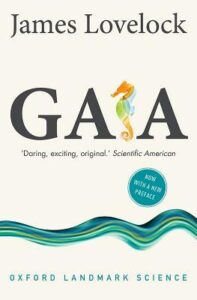 Gaia, James Lovelock
Gaia, James Lovelock
When I’ve heard of the Gaia theory before, I’ve usually heard of it in a sceptical sort of context that criticises the tree-hugging idea that Earth has a soul. That is not actually the main thrust of Lovelock’s argument at all: instead, what he argues is that Gaia, or Earth, is a self-sustaining system with in-built feedback loops which hold it more or less steady and capable of supporting life.
If you’ve studied climate or geology or even the water cycle, you know that he’s not wrong about the self-sustaining system. There’s so many negative feedback loops which keep things in check — some of which are, of course, threatening to be sabotaged by the action of one particular upstart mammal species with delusions of grandeur. We’re a part of the system, of course, but one which may have got out of hand. Or maybe not; maybe our intelligence will help rein us back in. We can only hope.
The point is, Lovelock’s not saying anything about a cosy loving Earth Mother spirit watching over us. Though his language in this book is sometimes poetical, and his sense of wonder at nature is clear, he’s talking about self-regulating, self-sustaining systems. He’s talking about the fact that the world has checks and balances in place which bring Earth into equilibrium, even though other factors — like the sun’s energy output — have changed over time. And okay, at some points he goes off on a tangent about whale intelligence and a hypothetical future in which whale brains give us technological advances, but the science here isn’t wrong.
There’s nothing actually revolutionary or tree-hugging here. It’s just true. Call it Gaia or call it a complex set of feedback loops; whatever you’re comfortable with, I guess. I do wish I’d read Revenge of Gaia instead, since this is horribly optimistic that humans will pull our collective fingers out and stop damaging the planet. I suspect Lovelock’s less sanguine about that prospect now.

I guess calling it “Ecology” was nixed by the marketeers…
I think Lovelock’s view is of a more… self-healing system than typical ecology. He does mention in the preface that he wishes now he’d picked a less poetic name for the theory, since it puts people off.
There’s zip original about the idea of modelling the planetary ecology-geophysical system as a set of coupled feedback loops, some positive, some negative. It’s probably been around as long as climate modelling has, at least. It’s an open question just how robust it is (mass extinctions occur) except that it’s generally accepted that wiping out all life really implies destroying the entire planet physically.
The book was written in the 1970s, and actually caused a whole wave of that kind of thought, in cooperation with Lynn Margulis. It certainly was original when introduced, and strongly opposed by some, like Richard Dawkins and Stephen Jay Gould. It’s been a massively influential theory.
I think the answer to the mass extinctions issue in terms of Gaia theory is to point to how robust the planet actually is; crises in the biotic or abiotic sides of the equation tend to be compensated for by the other, returning Earth to an equilibrium state (though not always the same equilibrium).
Fairy Nuff – and anything that got Dawkins and Gould to AGREE is remarkable!